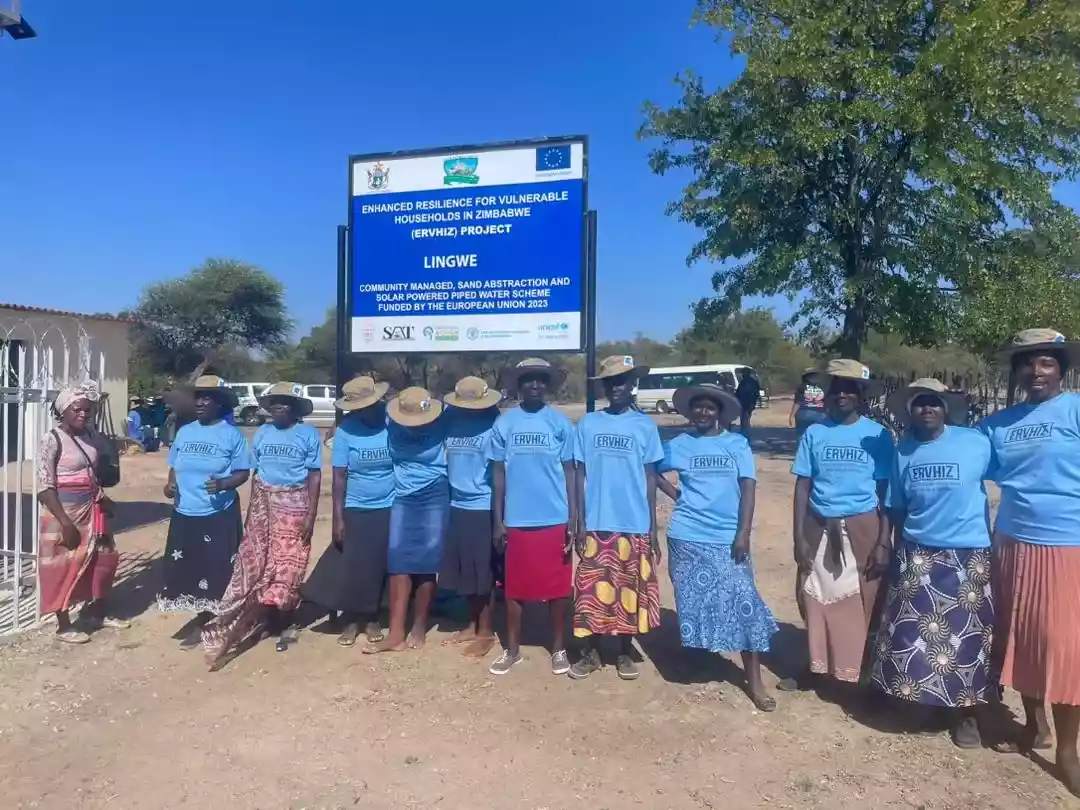
After walking a distance of over eight kilometres every day for several years to fetch water, Evis Dube from Matabeleland South’s Matobo District is a relieved person
Dube (46) from Lingwe village now fetches water from a point that is a few metres from her homestead after the Food and Agriculture Organisation, Unicef and the government rehabilitated the Lingwe Piped Water Scheme, which was commissioned early this year.
Other partners, who contributed to the project success included Christian Care Zimbabwe, Sustainable Agriculture Technology, Nutrition Action Zimbabwe (NAZ) and the European Union under the Enhanced Resilience for Vulnerable Households in Zimbabwe (ERVHIZ) Project.
The nearby water taps have significantly enhanced the sense of security among the women and young girls in the community.
Dube and other women had to endure the challenges, but they now rely on safe water sources from the taps less than 400 meters from their homes while others only walk 100 meters.
The piped water scheme project, which covers 13km benefits 135 households from Lingwe Village, 20 households from Zamadube village in ward 9 and five households from Matshina Village in ward 8.
Other wards — nine, 10 and 19 — benefit through dipping their cattle at the scheme, which benefits more than 1 300 people, including people with disabilities.
“We survived by fetching water from the riverbed and we thought it was clean water, only to notice now that the water was not safe for drinking,” Dube told Southern Eye on Sunday.
- Piped water scheme brings relief to Matobo women
Keep Reading
“In 1992, we had a piped water scheme, which used a diesel engine and pumped water to a tank which is 2.7km away from here and this scheme only covered 6km.
“Then from 1999 to 2022, we resorted to the water which was unsafe.”
She said the government and council also tried to drill boreholes for the communities, but could not reach water levels.
“In 2022, the government came with its partners to assess what could be done so that we can get clean water. A survey was done including water testing among other things,” Dube said.
“They found out that the water was available, but the riversand covered about three metres deep. Then they decided to work on the solar system and pipeline.
“Then from here, 60 meters away from the source, there is an artificial source which is a well and it is 7.5 metres deep.
“That’s where we have our pump. We have the four horsepower pump, which takes the water to the tanks.”
She said the water is then pumped to a smaller tank where chlorination is done before it is further pumped to three 10 000 litre tanks.
Dube said the water scheme has benefited businesses, a school and the villagers have since established a nutritional garden.
“We have a nutritional garden, which is one hectare and has 50 farmers benefiting from the pipe water scheme,” she said.
“It has helped us, especially women. We used to walk 8km a day carrying buckets to fetch water.
“Imagine, how many buckets can one carry a day traveling so many kilometres or pushing a wheelbarrow.
“Most women were raped on their way to fetch water because the area has thick forests.
“This project has also helped to reduce incidents of gender-based violence in many households, as water used to be a source of conflict.
“Our husbands used to refuse to help us to fetch water and they didn't see the need to conserve the water at home, leading to arguments.”
Siduduzile Siziba (40) echoed the same sentiments saying having clean water nearby meant more than just hydration.
“It frees us from the dangers of long journeys. We can now walk tall with a newfound sense of security,” Siziba said.
Martha Banda (45) said the project had provided the much-needed relief for the communities.
“In this arid region with minimal rainfall, the water scheme has enabled us to cultivate vegetables, tomatoes, butternuts, and more, which we can now sell, helping us generate income,”” Banda said. "Additionally, tending to the gardens will keep us occupied."
Lingwe village headman Midas Ndebele (82) hailed the government and its partners for coming to their rescue.
“This project is a significant milestone for us as it addressed many issues in our community,” Ndebele said.
“We now have access to safe drinking water. We are grateful to the government, Unicef, and all the other partners for restoring our dignity.”
Lingwe Piped Water Scheme project officer Shepherd Shumba said the initiative had empowered the community.
“Through community training and inclusive engagement at every stage, we've guaranteed that this source of clean water will sustain generations to come,” Shumba said.
Unicef’s Wash resilience capacity building consultant Takaendesa Sanangurayi said the project would help the community to be resilent in the face of the El Nino-induced drought.
“By integrating Wash, agriculture, and nutrition, the ERVHIZ project has delivered a sustainable solution for clean water access and enhanced health in the Lingwe community,” Sanangurayi said.
A NAZ representative said the project had empowered the community to take control of their health by growing fresh and nutritious food sustainably.
Christian Care Zimbabwe programmes director Regis Makoni hailed partners in the project.
“Everything needs water to survive, from plants to animals. As an organisation we couldn't ignore the pleas of the people of Lingwe,” Makoni said.
“However, we couldn't achieve this alone, so we partnered with other organizations and the government to bring this precious resource to the community.”
The project had also ensured that there were security measures to safeguard the infrastructure with fencing and other protective features were installed around the solar panels, pumps, and tap stands to prevent vandalism and theft.







